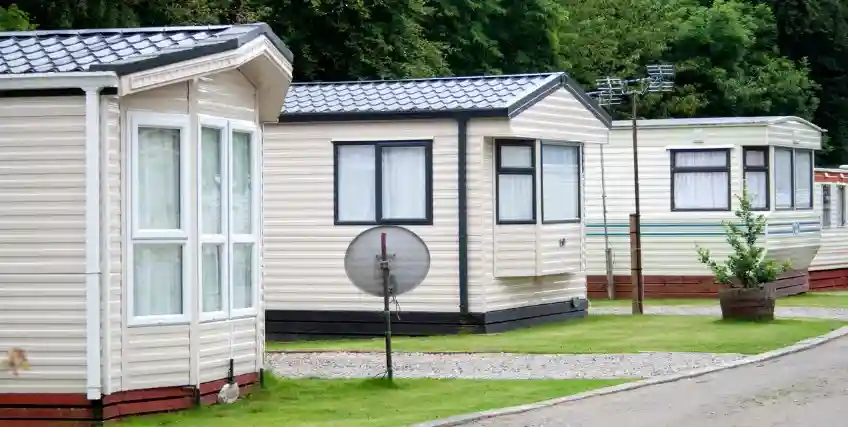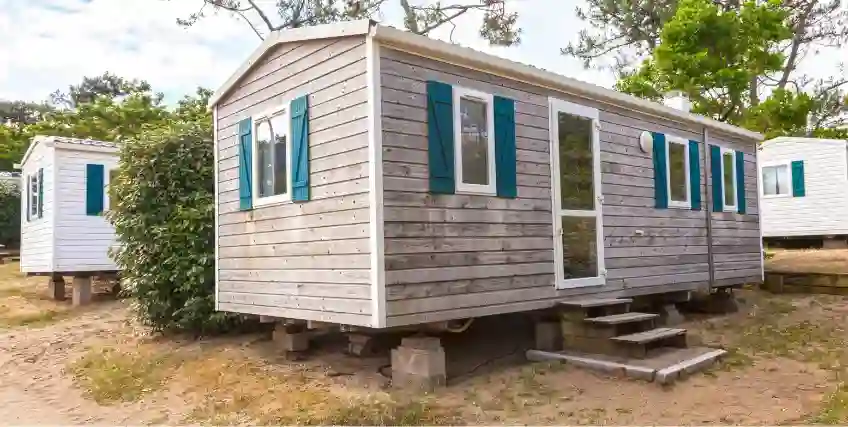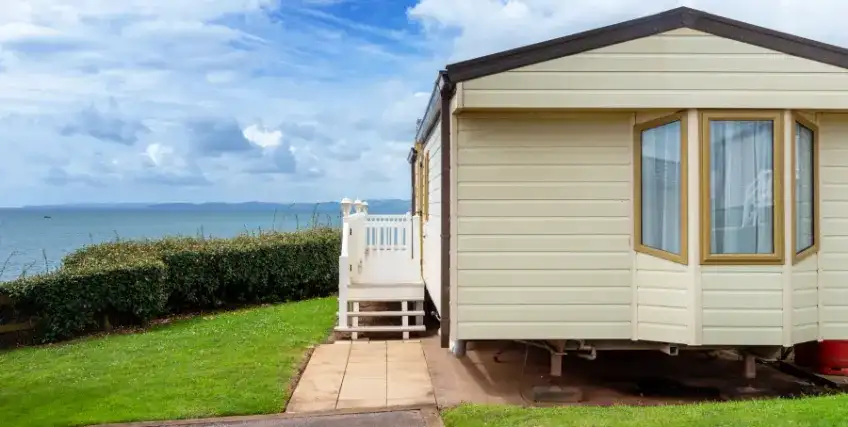Small Mobile Home Park Loans: Financing Options for Affordable Investments
Sep 30, 2025 | Last Updated on: Oct 01, 2025

Mobile home parks are an essential part of affordable housing in the United States. They provide families with an alternative to traditional homes while offering business owners stable cash flow.
For business owners looking to invest in manufactured housing communities, securing the right financing option is important. Small mobile home park loans are financing solutions that can help fund land acquisition, infrastructure improvements, or even refinancing existing dept. As a result, this will help mobile home park businesses to grow efficiently.
To invest in a mobile home park isn’t just about buying property. It also requires building sustainable community. From single wide to double wide homes, each mobile home park requires careful planning, understanding of occupancy trends, and the right loan program to maximize returns.
Here's what you need to know about small mobile home park loans.
What Is a Mobile Home Park Business?
A mobile home park is a real estate investment where land is leased to residents who place single wide or double wide manufactured homes.
Business owners running a mobile home park business manage leases, collect monthly payments, maintain infrastructure, and ensure the community remains attractive to residents. Moreover, the park generates steady income through lot rents, utilities, and fees for amenities, creating a reliable cash flow for various business purposes.
There are various mobile home park financing options available that can be used by business owners in the U.S. for supporting expansions, improvements, or refinancing opportunities. Additionally, successful business owners typically focus on high occupancy rates, good maintenance, and building strong relationships with residents to maximize the park’s long-term value.
Mobile home park owners do not own the homes themselves, unlike traditional multifamily properties. Hence, this reduces maintenance costs and increases cash flow. These parks include different property types with 20-50 lots or larger commercial properties with 100+ lots. So, business owners can go for different options of loan sizes and financing approaches.
Why Small Mobile Home Park Loans Matter for Business Owners
As a business owner, if you’re planning to start or expand an existing mobile home park business, it is important to understand that financing is the backbone. This financing support allows you to turn plans into actions, whether that means purchasing land, upgrading facilities, or placing manufactured homes. Therefore, without proper small mobile home park loan options, even profitable parks may struggle to grow or maintain high occupancy.
In short, small mobile home park loans don’t just fund a purchase, they enable business owners to scale, improve cash flow, and enhance the value of their manufactured housing communities.
Here’s how small mobile home park loans unlock growth opportunities for business owners:
- Property acquisition: These business loans help cover the purchase price of land for the existing park.
- Infrastructure upgrades: Funds from small mobile home park loans can be used for infrastructure upgrades like roads, utilities, or community facilities.
- Expansion: Business owners can add more lots or homes to increase occupancy using business loans.
- Refinancing: Mobile home park financing options can also be used for refinancing existing debt to secure lower interest rates or improved loan terms.
- Cash out: Also, these loans can be used for cash out to access home equity and reinvest.
Funding Options for Small Mobile Home Park Businesses
Some of the important mobile home park financing options for business owners include:
SBA Loans
SBA loans are backed by the U.S. Small Business Administration and offer small business loans with lower interest rates, long amortization, and structured loan programs.
SBA loans for mobile home parks can be used to:
- Purchase an existing park or raw land.
- Upgrade infrastructure or place manufactured homes.
- Refinance recourse loans for better pricing.
- Support cash flow until occupancy reaches target.
Traditional Loans
Traditional loans for small businesses are commercial property loans that are offered by banks or credit unions. These loans often come with fixed rates or variable interest rates, requiring down payment.
Traditional loans for mobile parks can be used:
- Business owners can use these small mobile home park loans to acquire land or commercial property.
- These loans support financing for single wide or double wide homes.
- Funds can be used to maintain park operations and cover monthly expenses.
- Also, traditional loans may be able to be used as an option for an interest-only period, during initial development.
Seller Financing
Seller financing is a type of funding option where the seller acts as a lender. Business owners can negotiate directly with the seller for loan terms, including loan amount, interest rate, and loan-to-value (LTV) ratio.
Seller financing can be used as a small mobile home park loan option for:
- Purchasing parks when traditional loans are challenging.
- Lowering upfront down payment.
- Closing faster without lengthy underwriting.
- Financing smaller lots while growing the business.
Benefits of Small Mobile Home Park Loans
As a business owner, using small mobile home park loans offer many advantages including:
- Lower Entry Barriers: Funds from small mobile home park loans can be used to start a park with less capital.
- Predictable Monthly Payments: These loan options often come with fixed-rate or structured loan terms, simplifying planning.
- Equity Building: Small mobile home park loans help in equity building as amortization increases ownership over time.
- Flexible Financing: These business loans can also be used as a cash out option or for refinancing existing debt.
- Expansion: These business loans help add new lots or amenities to improve park value.
- Support Affordable Housing: Also, these loans help communities while growing your business.
Let’s understand this with the help of an example. A business owner wants to buy a 50-lot mobile home park. He can use an SBA loan for mobile home park to fund the initial project as it offers lower interest rate with a longer repayment term.
Factors Lenders Consider
Before seeking small mobile home park loan options for your business, pay attention to what lenders consider:
- Credit history: You need to have strong personal and business credit scores to qualify for small mobile home park loans.
- Loan size and LTV: The maximum loan amount depends on property value.
- Occupancy Rates: Lenders see parks with stable residents have lower risk. This indicated predictable cash flow.
- Property Location: High-demand areas and desirable locations increase property value and reduce lender risk.
- Loan Type: Lenders consider whether the loan is recourse or non-recourse, as this affects borrower liability.
- Borrower Experience: Experience managing multifamily or manufactured housing communities is preferred, as it indicates a higher likelihood of success.
- Underwriting Requirements: Lenders typically require financial statements, cash flow projections, and pricing analysis to ensure the borrower can meet monthly obligations.
Tips to Improve Loan Approval Chances
Here are some important tips to improve your small mobile home park loan approval chances:
- Try to keep your credit card balances low and pay bills on time.
- You need to prepare a detailed business plan, showing projected cash flow.
- Always compare small business loans from various local banks, SBA lenders, and agencies.
- You can offer a larger down payment to reduce lender risk.
- You can use home equity or refinancing to secure better loan terms.
- Make sure to work with NMLS-registered lenders to access a wide range of loan programs.
The Bottom Line
A mobile home park can be a profitable business while also supporting communities that need affordable housing. As a business owner in the U.S., you can purchase land, upgrade infrastructure, refinance debt, and expand operations with the right small mobile home park loan options.
There are a variety of business financing options available for you to choose from including SBA loans, traditional loans from local banks, seller financing, and hard money or bridge loans. However, each small mobile home park loan option comes with its own loan size, interest rate, amortization schedule, and loan terms designed to match different business goals.
FAQs About Small Mobile Home Park Loan Options
What is a mobile home park loan?
A mobile home park loan is a business financing option that helps business owners purchase, refinance, or improve manufactured housing communities. These loans can be used for buying land, upgrading infrastructure, or even refinancing existing debt at a lower interest rate.
How are mobile home park loans different from traditional real estate loans?
Traditional commercial real estate loans are often structured for offices or retail spaces. On the other hand, mobile home park loans account for factors like occupancy, loan-to-value (LTV) ratios, and the stability of manufactured home tenants. Therefore, lenders usually focus more on long-term cash flow and community strength.
What factors do lenders look at when approving a loan?
Lenders evaluate factors like credit history, loan size, and occupancy rates. They also review property location, loan terms, and your experience managing multifamily or manufactured housing communities. Moreover, financial documents like income statements and cash flow projections also weigh heavily in the underwriting process.
Can I refinance an existing mobile home park loan?
Refinancing existing debt is a common strategy and can be used for existing mobile home park loans. It allows you to lower your interest rate, extend loan terms, or tap into equity through a cash out refinance. Therefore, business owners often refinance to free up capital for improvements or expansion.
What is the difference between recourse and non-recourse loans?
Recourse loans mean you’re personally liable if the park can’t cover debt. While non-recourse loans limit liability to the property itself, which reduces personal risk but often comes with stricter requirements.
Frequent searches leading to this page
Related Articles
Term Loans are made by Itria Ventures LLC or Cross River Bank, Member FDIC. This is not a deposit product. California residents: Itria Ventures LLC is licensed by the Department of Financial Protection and Innovation. Loans are made or arranged pursuant to California Financing Law License # 60DBO-35839




